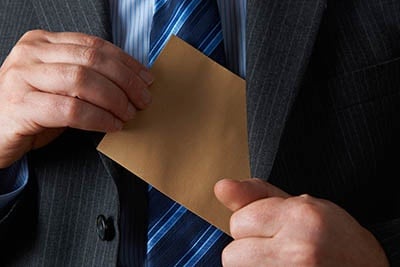 When most people think about white collar crime, two or three big-name, headline-making cases likely come to mind. The Enron debacle and the Bernie Madoff Ponzi scheme often top the list.
When most people think about white collar crime, two or three big-name, headline-making cases likely come to mind. The Enron debacle and the Bernie Madoff Ponzi scheme often top the list.
Most white collar criminals don’t end up on the cover of the New York Times, but that doesn’t mean they aren’t still a common concern, both for individuals and for businesses.
What counts as white collar crime in South Carolina? What sort of repercussions would someone convicted of white collar crime face?
Let’s take a look.
First Things First: What is White Collar Crime?
While there are as many ways to commit white collar crime as there are individuals who make the decision to do so, these cases usually have four important elements in common:
- They are nonviolent offenses
- They are financially motivated
- The crime is committed by a business or government professional or employee
- Deceit is a major aspect of how the crime was committed
Good examples of a white collar crime would be an accountant “cooking the books” to provide fraudulent information to the federal government on behalf of a business, or an office employee using the company credit card to embezzle funds from their employer.
In the famous cases listed in our first paragraph, the crimes involved fraudulent financial behavior that deeply affected employees and customers of the companies involved.
What Are Types of White Collar Crime?
Most white collar crimes can fall under the umbrella term “fraud”, or misrepresenting the truth to gain financial benefit.
Under that umbrella are several different subcategories, including:
- Check fraud: Knowingly writing checks to businesses or individual from accounts that do not have sufficient funds to cover the amount on the check.
- Insider Trading: A type of securities fraud, insider trading involves illegally using inside information to financially benefit: for instance by selling one’s stock in the company just before damaging information comes to light that will lessen their stock value.
- Securities Fraud by Misinformation: When the ownership or management of a company knowingly misrepresents information to gain new or increased investors. This might involve inflating profit margins, misrepresenting facts regarding recent events in the company, or misrepresenting loss statements.
- Credit card fraud: Stealing someone else’s credit card information to make purchases is a kind of fraud, as is knowingly using a revoked card to make purchases. Credit card fraud is a big part of identity theft, as well.
- Bank fraud: Bank fraud, which can be a federal crime, includes deceiving a financial institution like a bank or credit union for your own profit. Stealing checks, using stolen or deceptive information to open bank accounts, obtaining loans by misinformation, and check kiting all fall under bank fraud.
- Wire fraud: Have you ever heard about telephone scams that target the elderly or phishing emails that try to steal your private information? These are both forms of wire fraud, which involves utilizing the telephone, internet, or other across-state-line communication methods to carry out a crime.
- Mail fraud: While many of the other types of fraud can be federal crimes in some instances, mail fraud is a federal crime by definition. It involves using physical mail, up to and including USPS and also private carriers like FedEx or UPS, to commit fraud.
- Tax evasion: Any attempt to deprive the government of revenue you would otherwise owe is usually categorized as tax evasion. Falsifying tax returns, transferring property to avoid paying taxes, and under reporting income are just a few examples.
- Embezzlement: Embezzlement involves stealing money from an employer or a business partner. This might involve stealing actual cash or even using an employer’s card to make fraudulent purchases.
- Counterfeiting: Most people assume that counterfeiting involves the production and circulation of fake money, but the term also covers the manufacture and distribution of any cheaper imitation of a brand or product familiar to customers.
- Money laundering: Money laundering cases involving big-name companies often make the news, and for good reason: money laundering is a federal crime. To commit money laundering is to obtain funds illegally, but take actions that make the funds look like they were obtained using ‘legal’ means.
What If You’re Convicted of a White Collar Crime?
Many people assume that since white collar crimes are by definition nonviolent, that they would involve no truly serious repercussions. Movies and other popular culture have pushed the myth of “easy time”, suggesting that white collar crimes aren’t taken particularly seriously and will involve little, if any, significant penalties.
In fact, white collar cases are categorized as criminal, and many are considered federal crimes committed against the United States government.
If you’re accused of white collar crime in South Carolina, you could be facing a monetary fine, prison sentence, or combination of both. Criminal laws do authorize severe maximum penalties, and many defendants receive less than the maximum sentence, but this isn’t guaranteed.
The sentencing judge may consider certain factors about the case when deciding on the sentence, including the nature of the crime and if the defendant has a prior criminal record.
Someone without a significant criminal record may be sentenced to probation, a “suspended sentence”, or face time in jail. They may be required to pay certain fines, forfeit the profits of their fraud, or pay restitution to the victims affected.
Those facing more severe penalties may face time in prison.
Anyone convicted of one of these crimes could have a difficult time pursuing gainful employment in the future, or deal with financial stress as a result of the imposed penalties or fines.
Searching for Criminal Defense in Columbia, SC?
When accused of white collar crime, it’s essential to have legal representation with experience in the area of Criminal Defense. Our Criminal Defense team has represented individual accused of DUI, drug offenses, property crimes, white collar crimes, and more. Request your free consultation by phone at (803) 779-7599 or contact us online at any time.




